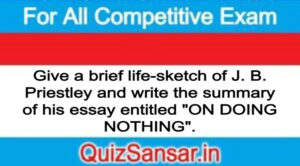
Give a brief life-sketch of J. B. Priestley and write the summary of his essay entitled “ON DOING NOTHING”.
Give a brief life-sketch of J. B. Priestley and write the summary of his essay entitled “ON DOING NOTHING”.
Ans.
John Boynton Priestley was an outstanding English critic, novelist, dramatist and essayist. He was born in Bradford in 1894. He received his education in his home town and after serving in the infantry in the First World War, he returned to pursue studies at the university of Cambridge. Thereafter he went to London where he worked as a reviewer, essayist and literary journalist.
Priestley was a director of the influential journal New Statesman and Nation and after declining a knighthood and a peerage, accepted the order of merit from Queen Elizabeth II in 1977. He died in Stratford-On-Avon on August 14, 1984.
His Works
Priestley may best be described as a man of letters’. ‘The Good Companions’ (1929). ‘Angel Pavement’ (1930), “They Walk in the City’ (1936), “Let the People Sing’ (1939), ‘Festival at Fairbridge’ (1951) and ‘The Magicians’ (1954) are some of his most popular novels.
Plays:
His plays are experimental in treatment of time and of past and future events. They include ‘Dangerous Corner’ (1932), ‘An Inspector Calls’ (1946), and ‘Diagon’s Mouth’ (1952).
Essays:
He was an eminent essayist. His essays find a place in ‘I For One’ (1923), “Open House (1927), “Apes and Angels’ (1928), The Balconinny and Other Essays’ (1929) and ‘Self-Selected Essays’ (1932).
Later Works:
His later books include autobiographical ‘Margin Released’ (1962), ‘Man and time’ (1964). ‘Essays of Two Decades (1961). “The Edwardians’ (1970), and The English’ (1973).
Critical Works:
Priestley is also known as a great critic of literature. His critical works include “The English Comic Writers’, “The English Novel’, ‘Literature and the Western Man”.
His prose style is marked by simplicity, lucidity and clarity, wit and humour. His essays give the impression of a friendly, informal chat.
Summary
‘On Doing Nothing’ is one of the famous essays of J. B. Priestley. His essays are based on personal experience. Priestley got a chance to stay with his friend in Yorkshire. Every evening both the friends climbed up the moor and lay down on their back on some beautiful spot. There they looked at the sky and other natural objects. Without doing anything the whole day, they enjoyed the beautiful sights of Nature. They were free from worldly cares. The writer enjoyed so much that he considers idleness as a virtue. He says that one should pass some time on doing nothing.
By telling us the importance of idleness the writer says that all the evils on the earth are brought about by the persons who run after money, name and fame. These persons are always busy. They all are disciples of devil. The devil himself is the busiest person in the world. He likes busy people. To prove this point Priestley gives some examples. He says that the First World War could have been avoided, if all the leading politicians of the great powers had been rested and cleaned their minds. It was possible through their idleness. Their Peace Conference would have produced different results.
Today there is a great confusion in the world which is the result of continuous activity. This activity gives rise to many evils like selfishness and material gains etc. He further says that we can still gain much, if we rest and clean our minds by doing nothing. Laziness does not bring any evil but it purifies the mind.
Wordsworth, the great lover and the poet of Nature teaches us to retire into the forest and to gaze at Nature to get mental peace.
Thus an idle life makes the mind quite free from all physical and mental cares and provides peace to man’s soul. So we should adopt idleness.
-
Write the critical appreciation of the poem No. 12 entitled Far Below Flowed.
-
Write the critical appreciation of the poem No. 11 entitled Leave this Chanting.






